Helpdesk software is a tool used by businesses to provide customer support and manage incoming inquiries. It helps streamline communication, track issues, and prioritize tasks to ensure timely resolution.
The helpdesk software is aimed at customer service teams, IT departments, and any organization seeking to enhance their support processes.
Helpdesk software is crucial for companies seeking to improve customer satisfaction and streamline the handling of customer inquiries.
Key Features Of Helpdesk Software
Helpdesk software typically includes major components such as ticketing systems, knowledge bases, chat support, automation tools, and reporting/analytics features.
Ticketing systems help track and manage customer inquiries, while knowledge bases provide self-service options for users.
Automation tools streamline processes and improve efficiency, while reporting and analytics features offer insights into helpdesk performance.
Overall, these components work together to enhance customer support and streamline helpdesk operations.

Pros
- Many integration options available
- Robust ticketing system
- Extensive integration options
- Multi-channel support
- Advanced reporting and analytics
- AI-powered technology
Cons
- Certain advanced features may require higher-tier plans.
- Pricing may be high for some businesses
- Learning curve for more advanced customization
- Learning curve for complex configurations
One of its major advantages over competitors is its user-friendly interface and easy customization options. Additionally, Zendesk provides robust reporting and analytics tools to help businesses track and improve customer satisfaction levels.
Its integration with other business tools and platforms also sets it apart from its competitors, making it a versatile and comprehensive customer service solution for companies of all sizes.
Overall, Zendesk is a comprehensive solution for businesses looking to streamline their customer service operations and improve customer satisfaction.
Pricing
The pricing for Zendesk's Suite offerings ranges from $55 per agent per month for Suite Team, $89 for Suite Growth, $115 for Suite Professional, and contact support for pricing on Suite Enterprise.
Some Key Features Of Zendesk Include
- Tailored Perspectives
- User-Driven Solutions
- Seamless Voice Integration
- Data Insights and Reporting
- Dynamic Live Chat and Messaging
- Enhanced Team Collaboration
- APIs, SDKs, and App Synergies
- Efficient Routing Automation
- Personalized Branding
- Versatile Omnichannel Assistance
2. Freshdesk
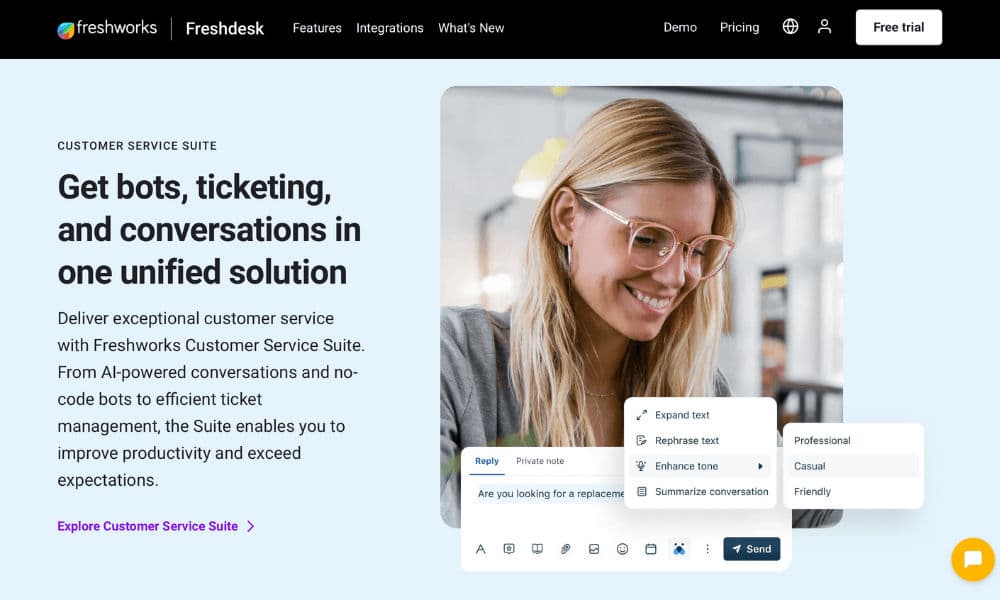
Pros
- Efficient ticket routing
- Extensive ecosystem for integrating third-party
- User-friendly interface
- Multichannel support
- Automation capabilities
- Knowledge base functionality
Cons
- Setting up can take a lot of time for bigger teams.
- Some restrictions on customization
- Advanced features may require higher-tier plans
Some key features include ticketing management, automation tools, self-service portals, reporting and analytics, multichannel support, and integrations with other business tools.
With Freshdesk, businesses can easily manage customer inquiries, track support tickets, collaborate with team members, and provide timely and efficient customer support.
The platform is user-friendly and customizable, making it suitable for businesses of all sizes.
Overall, Freshdesk is a comprehensive customer support solution that can help businesses improve their customer service processes and enhance customer satisfaction.
Pricing
This pricing plan offers a free option for up to 10 agents, with the option to upgrade to Growth for $15 per user per month, Pro for $49, or Enterprise for $79. This tiered pricing structure allows for scalability as the business grows, providing flexibility in choosing the level of service that best fits the organization's needs and budget. The free option for smaller teams is a great way to get started with the platform before committing to a paid plan.
Some Key Features Of Freshdesk Include
- Analytics and Reporting
- Mobile Application Features
- Catalog of Services
- Pre-packaged Responses
- Workflow Approvals
- Management of Releases
- Dashboards for Teams
- Management of Service Level Agreements
- AI-driven Chatbot by Freddy
3. Zoho Desk
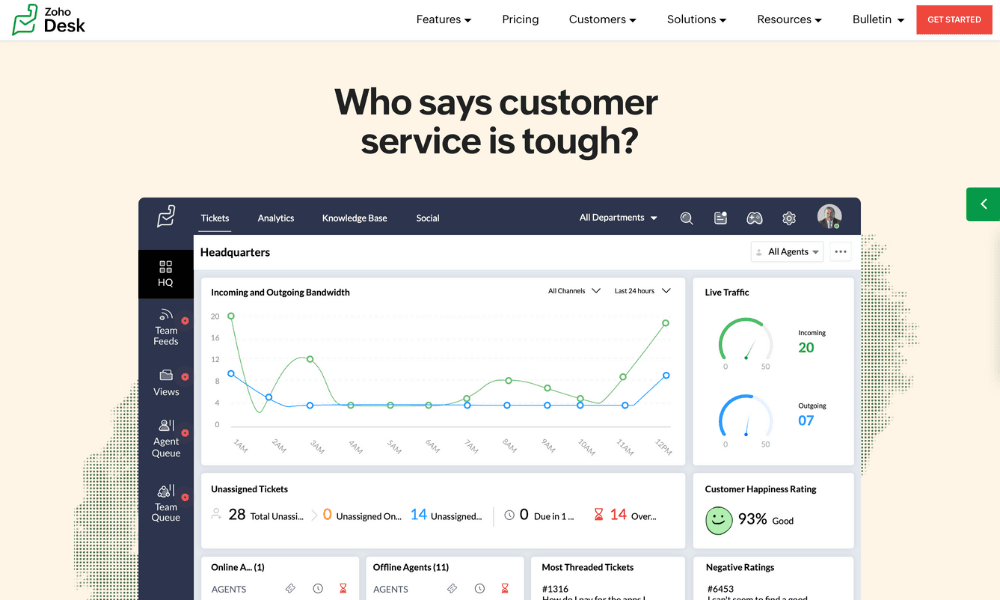
Pros
- User-friendly interface
- Multi-channel support
- Automation and customization options
- Knowledge base functionality
- Integration capabilities
- Innovative AI assistance
Cons
- Steeper learning curve for advanced features
- Businesses new to AI might find it overwhelming.
- Interface may seem crowded with a large number of features.
- Requires a learning curve to make full use of most of its features.
It stands out from its competitors with its user-friendly interface, customizable dashboards, and integration with other Zoho products. Zoho Desk also provides advanced AI-powered tools like Zia, which helps in automating repetitive tasks and improving overall efficiency.
Overall, Zoho Desk is a comprehensive solution for businesses looking to streamline their customer support operations and provide excellent service to their clients.
Pricing
Zoho Desk has a free version and trial for users to try before choosing a paid plan starting at $14.00 per month. This allows for testing and decision-making without financial commitment. The availability of free and paid options caters to all types of businesses. The paid version offers more features to improve customer support processes and is valuable for streamlining support operations.
Some Key Features Of Zoho Desk Include
- Ticketing
- Self-service Portals
- Multi Channel Support
- Knowledge Base
- Telephone Integration
- Reporting
- Analytics
- Contexual AI Assistance
4. Help Scout
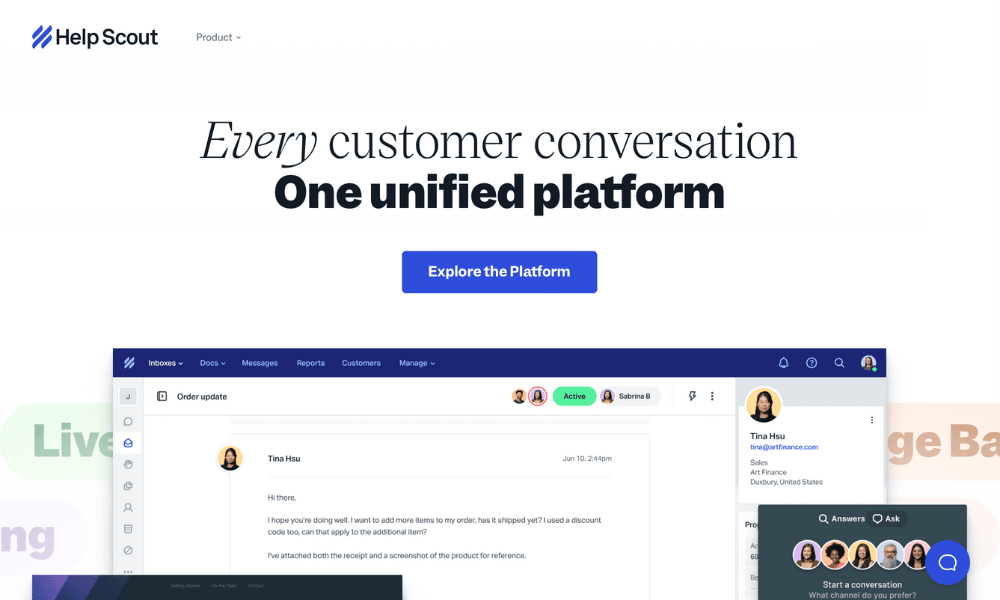
Pros
- User-Friendly Interface
- Collaboration Features for Teams
- Robust Knowledge Base
- Email Integration
- Customer Satisfaction Tracking
Cons
- Limited Advanced Automation
- Pricing May Be High for Small Businesses
- Advanced Reporting Features Could Be Enhanced
One of the key advantages of HelpScout is its focus on providing a personalized customer support experience. The app allows businesses to track customer interactions, provide timely responses, and customize communication channels to suit their brand. Additionally, HelpScout's reporting and analytics tools help businesses gain valuable insights into customer behavior and support performance, enabling them to make data-driven decisions.
Overall, HelpScout is a reliable and efficient helpdesk solution that can help businesses streamline their customer support operations and enhance customer satisfaction.
Pricing
HelpScout provides customer service software with a free trial option, along with paid plans such as Standard at $20 per user per month, Plus at $40, and Pro at $65. This pricing model enables users to select a suitable plan based on their requirements and financial constraints, making HelpScout a versatile choice for companies seeking to enhance their customer support services.
Some Key Features Of Helpscout Include
- Automation Based on Rules
- Integration Extensions
- Pre-designed Response Templates
- Live Chat on Websites
- Analytical Insights
- Prioritized Ticket Routing
- Tools for Collaboration
- Branding Customization
- Management of Knowledge Base Content
- Support Across Multiple Channels
5. SysAid
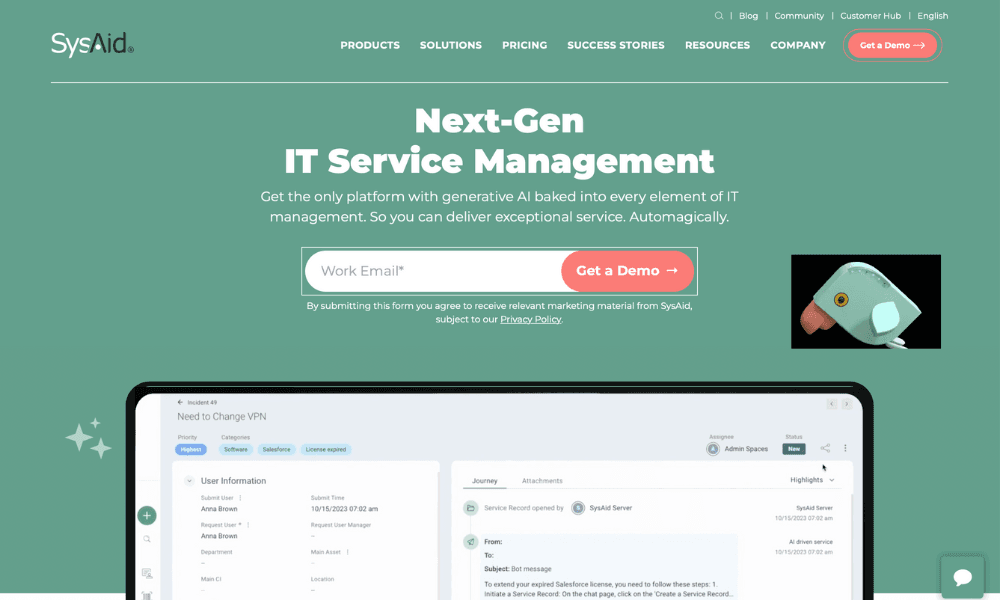
Pros
- Comprehensive IT Service Management (ITSM) functionality
- Multi-channel communication options
- Robust automation capabilities
- User-friendly interface
- Asset management features
Cons
- Customization may be limited for some advanced users
- Steeper learning curve for new users
- Reporting functionality could be more advanced
Pricing
SysAid provides a free trial for their services, giving potential customers the chance to try out the platform before purchasing. With a starting price of $79 per month, the paid version is budget-friendly for businesses seeking to enhance their IT service management.
Some Key Features Of Sysaid Include
- Assigned Customer Success Manager
- Integration with LDAP (Active Directory)
- ITIL Package Inclusion
- Customizable Advanced Fields
- Support for Third-Party Integrations
- Task Automation Features
- Beta version of a Business Value Dashboard
6. HappyFox
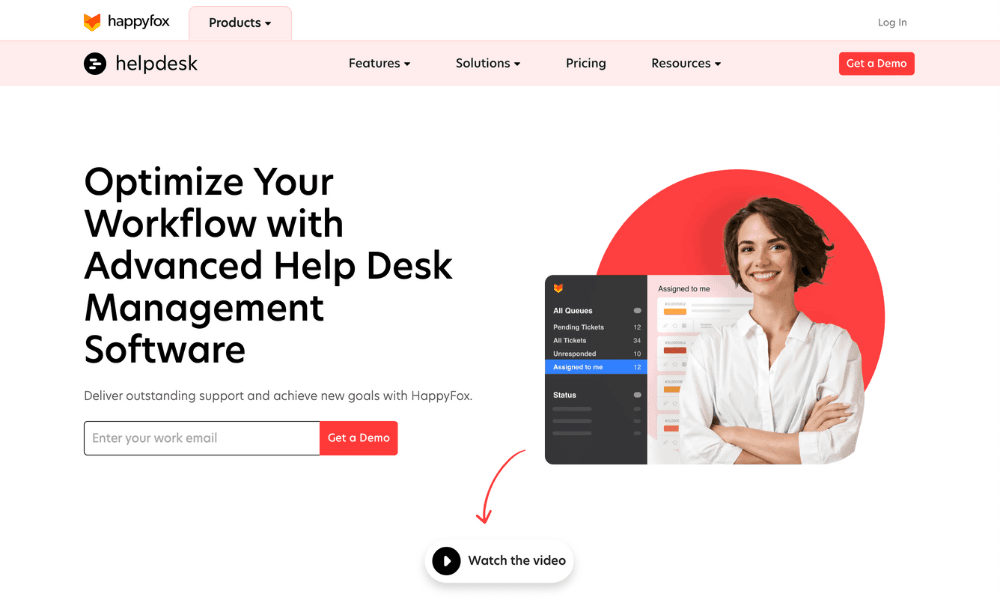
Pros
- User-Friendly Interface
- Comprehensive Reporting Tools
- Multi-channel Support
- Advanced Automation Features
- Integration with Popular CRM Systems
Cons
- Steep Learning Curve for Beginners
- Premium Pricing Tiers
- Limited Customization Options
- No Free plan & Free trail
One of the key advantages of HappyFox over its competitors is its user-friendly interface and easy customization options. It allows businesses to tailor the software to their specific needs and workflows, making it more efficient and effective.
Additionally, HappyFox offers excellent customer support and regular updates to ensure that users have the best experience possible. Overall, HappyFox is a comprehensive customer service solution that can help businesses streamline their support processes and improve customer satisfaction.
Pricing
HappyFox helpdesk offers a range of pricing options, which include a free trial and paid plans starting at $39 per agent per month.
The paid plans are categorized into Mighty ($39), Fantastic ($59), Enterprise ($79), and Enterprise Plus ($99) editions, each providing varying features at different price points. Users have the flexibility to choose a plan that best fits their needs and budget.
Some Key Features Of Happyfox Include
- Intelligent automation through rules
- Utilization of API, SDKs, and webhooks
- Macros for efficient workflow
- Real-time chat on websites
- Comprehensive advanced reporting
- Ticket routing, categorization, and tagging capabilities
- Unlimited shared inboxes for collaboration
- Customization of branding
- Efficient knowledge base management
- Multi-channel communication options
7. JIRA Service Management
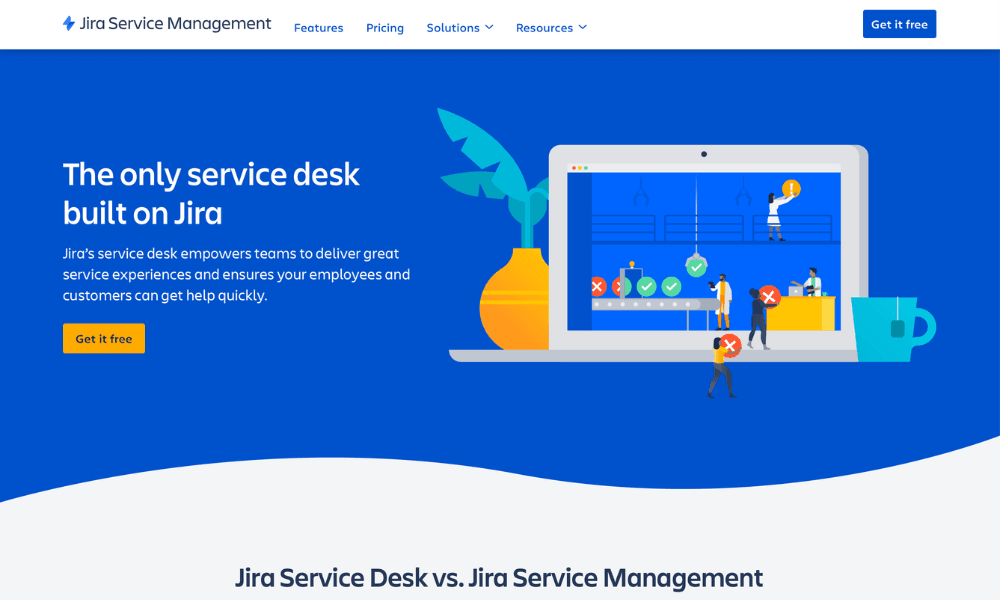
Pros
- Robust Ticketing System
- Customization Capabilities
- Integration with JIRA Software
- Advanced Reporting and Metrics
- Automation Features
Cons
- Steep Learning Curve
- Cost
- Overwhelming for Small Teams
- Limited Out-of-the-Box ITIL Support
One of its key strengths is its seamless integration with other Atlassian products like Jira Software and Confluence, enabling a more efficient workflow and collaboration within the organization.
With advanced automation capabilities, reporting tools, and customizable dashboards, Jira Service Management helps teams effectively handle and resolve customer requests. Its user-friendly interface and robust features make it a popular choice for organizations seeking to enhance their service desk operations and improve customer satisfaction.
The free plan allows limited use with three agents or 10 users, while the Standard and Premium plans offer a seven-day free trial and support up to 5,000 agents.
Pricing
The content provides information about the pricing for JIRA Service Management, starting at $60.00 per month. It also mentions that JIRA Service Management offers a free trial and has a free version available. This is useful for individuals or businesses looking to explore the features and benefits of JIRA Service Management before making a financial commitment.
Some Key Features Of Jira Service Management Include
- Conversational ticketing
- Postmortems for incidents
- Management of IT assets
- Management of changes
- Generation of reports and metrics
- Management of SLAs
- Management of assets
- Chat for service desk
- Automation with intelligence
- Knowledge base (requires Confluence subscription)
- API integration
- Management of incidents
- Self-service portal
8. Salesforce Service Cloud
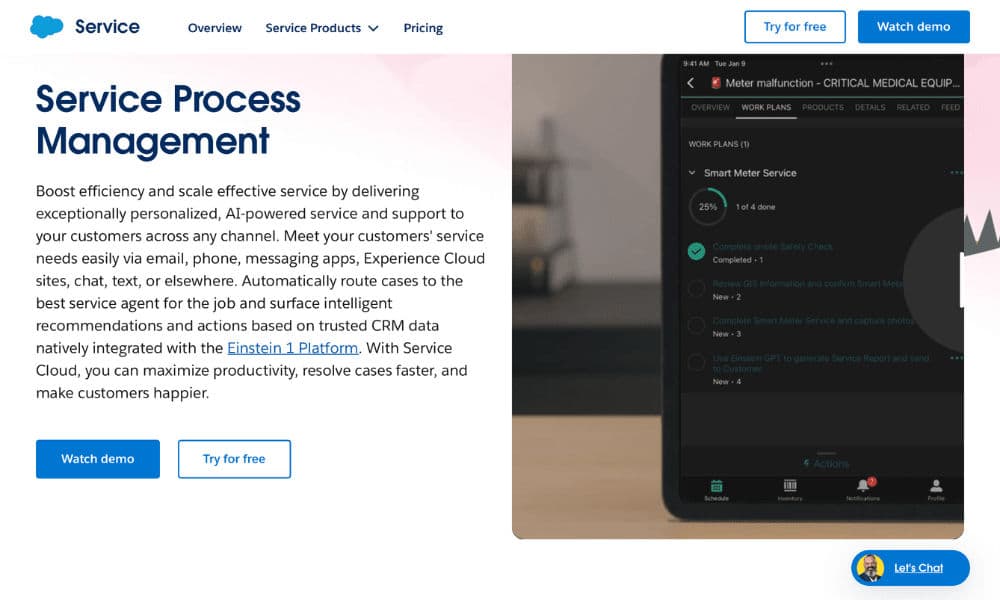
Pros
- Comprehensive Customer Data Management
- Extensive Integration Capabilities
- Powerful Automation and Workflow Tools
- Scalable and Customizable
- Robust Analytics and Reporting
Cons
- High Implementation and Maintenance Costs
- Steeper Learning Curve for Advanced Features
- Dependency on Internet Connectivity
One of the key advantages of Salesforce Service Cloud over its competitors is its seamless integration with other Salesforce products, such as Sales Cloud and Marketing Cloud. This allows businesses to have a complete view of their customers across all touchpoints and departments. Additionally, Service Cloud's scalability and customization options make it suitable for businesses of all sizes and industries.
Overall, Salesforce Service Cloud is a comprehensive solution for businesses looking to streamline their customer service processes, improve efficiency, and ultimately enhance the overall customer experience.
Pricing
Salesforce Service Cloud provides both a free trial and a paid version of their service. For more information on pricing and features, interested individuals can contact their support team or visit their website. This flexibility allows users to explore the platform before making a commitment, ensuring that they find the best solution for their needs.
Some Key Features Of Salesforce Service Cloud Include
- Effective Knowledge Management
- Automation of Workflows
- Utilization of Webhooks, SDKs, and APIs
- Seamless Third-party Integrations
- Omnichannel Routing for Enhanced Communication
- Analytics for Support Operations
- Efficient Asset Management
- Remote Access Capabilities
- Interactive Self-help Portal
- Engaging Customer Forums
- Streamlined Workflow Automation
- Effective Call Center Management
9. SolarWinds Service Desk
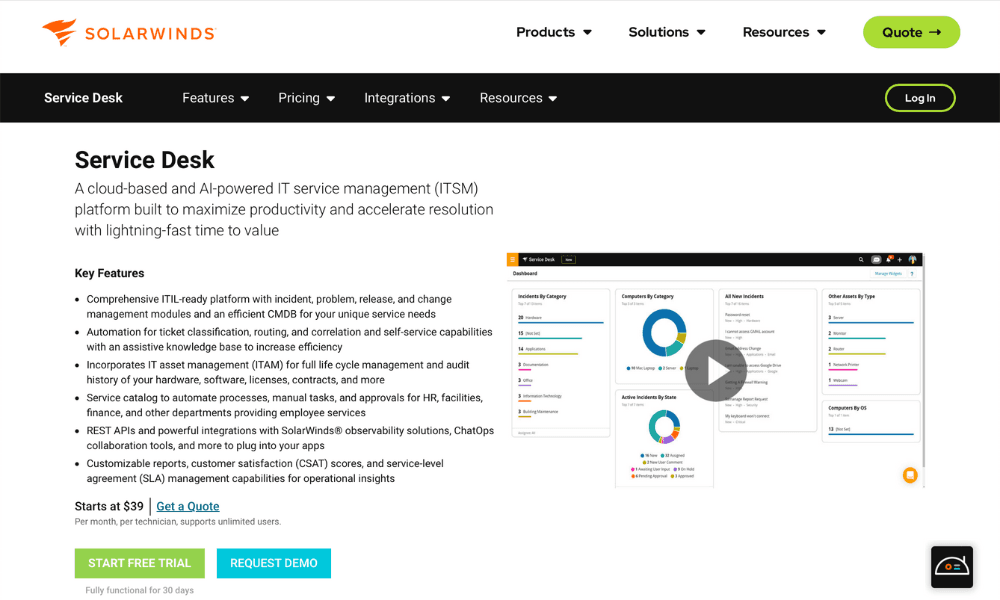
Pros
- Comprehensive IT Asset Management
- Customizable Dashboards and Reports
- Integration Capabilities with Other Tools
- Automated Ticketing and Workflow
- Knowledge Base for Documentation and FAQs
Cons
- Initial Learning Curve for New Users
- Some Advanced Features Require Additional Licensing
- Higher Cost for Full Feature Set
It stands out from its competitors with its user-friendly interface, customizable workflows, automation capabilities, and deep integration with other SolarWinds products.
The platform also provides real-time reporting and analytics to help organizations make data-driven decisions and improve their IT services.
Overall, SolarWinds Service Desk is a powerful solution that can streamline IT operations, increase efficiency, and enhance customer satisfaction.
Pricing
SolarWinds Service Desk offers a free trial for 30 days, allowing potential customers to test out the platform before committing to a paid plan. The paid plans start at $19, making it an affordable option for businesses looking for an efficient service desk solution.
Some Key Features Of Solarwinds Service Desk Include
- Mapping of Relationships
- Management of Changes
- Management of IT Assets
- Software for Configuration Management Database (CMDB)
- Knowledge Base for Help Desk
- Tools for Procurement
- Automation of Services
- Chat for Service Desk
- Reporting for Service Desk
- Management of Risks
10. Vivantio
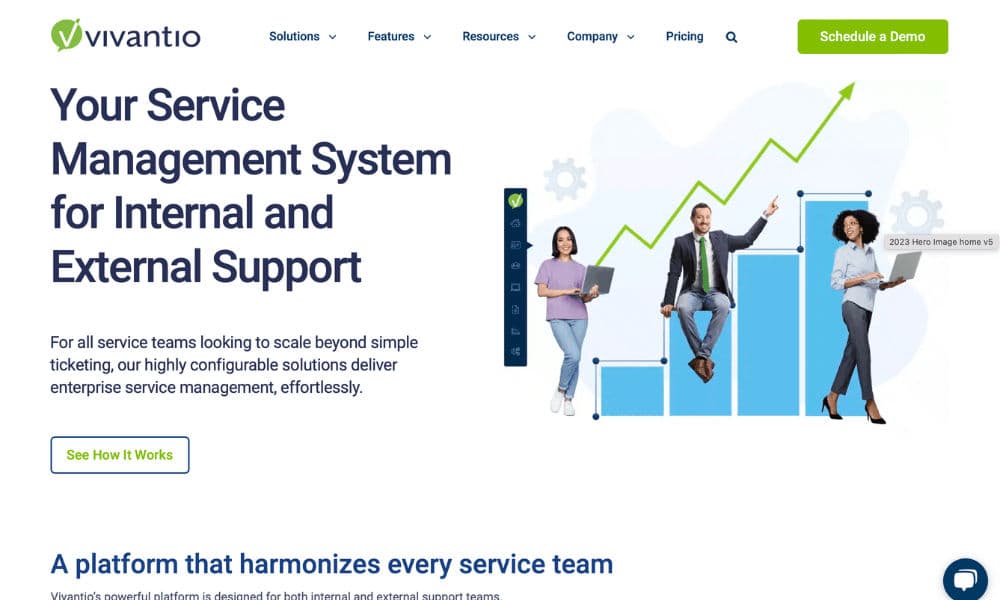
Pros
- Robust Ticketing System
- Extensive Customization Options
- Strong IT Asset Management
- Advanced Workflow Automation
- Responsive Customer Support
Cons
- Learning Curve for New Users
- Pricing Can Be High for Small Businesses
- Integration Options Can Be Limited
One of its strengths is its customizable workflows and automation capabilities. Vivantio is known for its user-friendly interface, easy integration with other tools, and excellent customer support. It is a robust solution for businesses aiming to streamline service management processes and enhance efficiency.
Vivantio provides various plans, starting from the basic Value plan at $42 per month per user, up to the enterprise help desk software Visionary plan at $142 per month per user.
Pricing
Vivantio offers a free trial along with two paid editions: Named License for $99 and Concurrent License for $149. More information on pricing can be found on their website. This pricing structure allows customers to choose the option that best fits their needs and budget, making Vivantio a flexible solution for businesses of all sizes.
Some Key Features Of Vivantio Include
- Hierarchical Ticketing
- User-Friendly Interface
- Support Centers in the U.S. and U.K.
- Management of Call Centers
- Feedback and Survey Mechanisms
- Live Chat in Real Time
- Effective Queue Management
- Management of IT Assets
- Configuration of Workflows
Key Factors We Considered When Compiling This List
When listing top helpdesk software, it is important to consider factors such as ease of use, features offered, customization options, integration capabilities, pricing, and customer support. These elements will help businesses choose a helpdesk solution that aligns with their specific needs and requirements. Additionally, looking at user reviews and ratings can provide valuable insights into the overall user experience and satisfaction with the software. By thoroughly evaluating these points, companies can make an informed decision and select the best helpdesk software to enhance their customer support operations.

